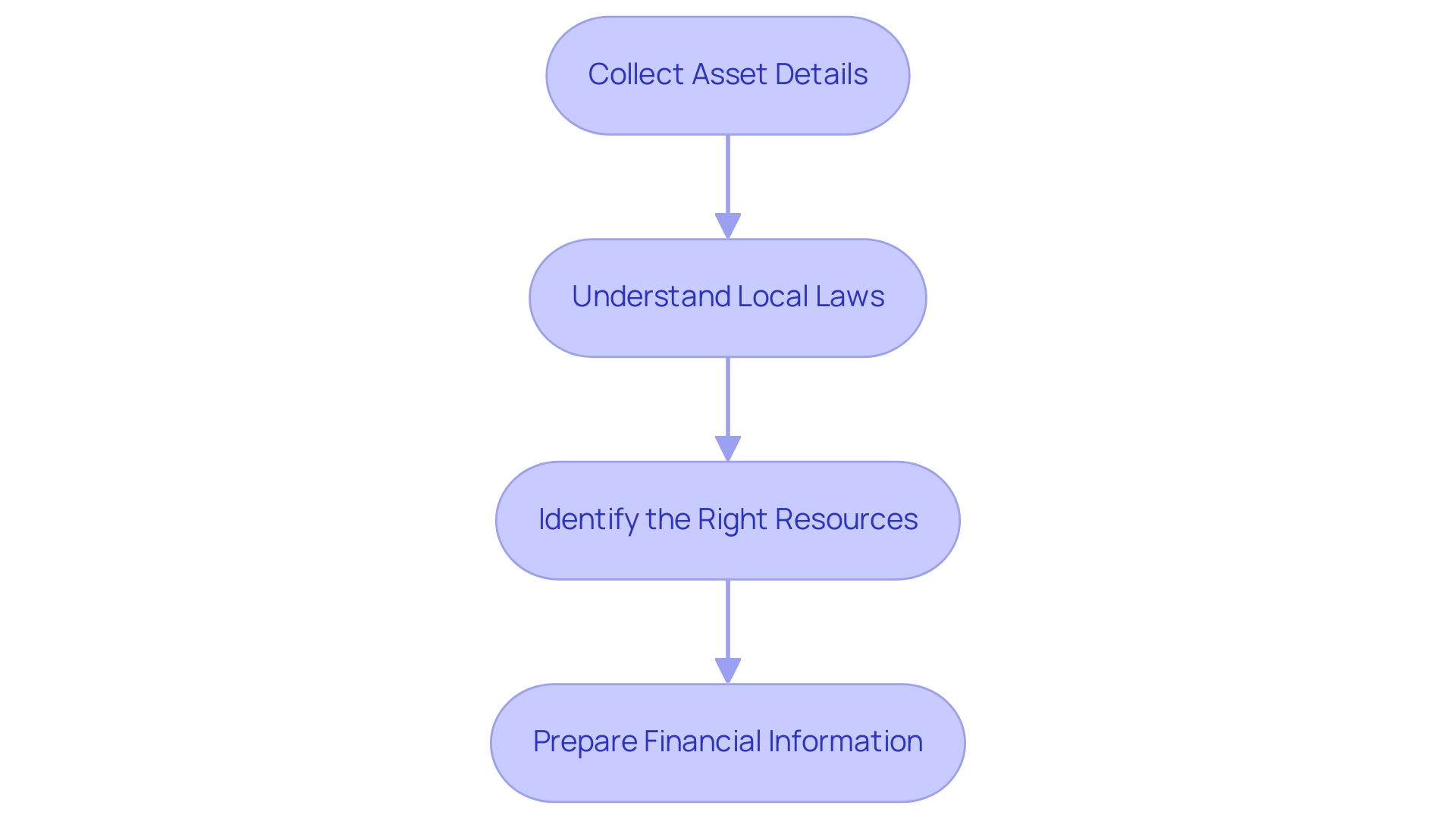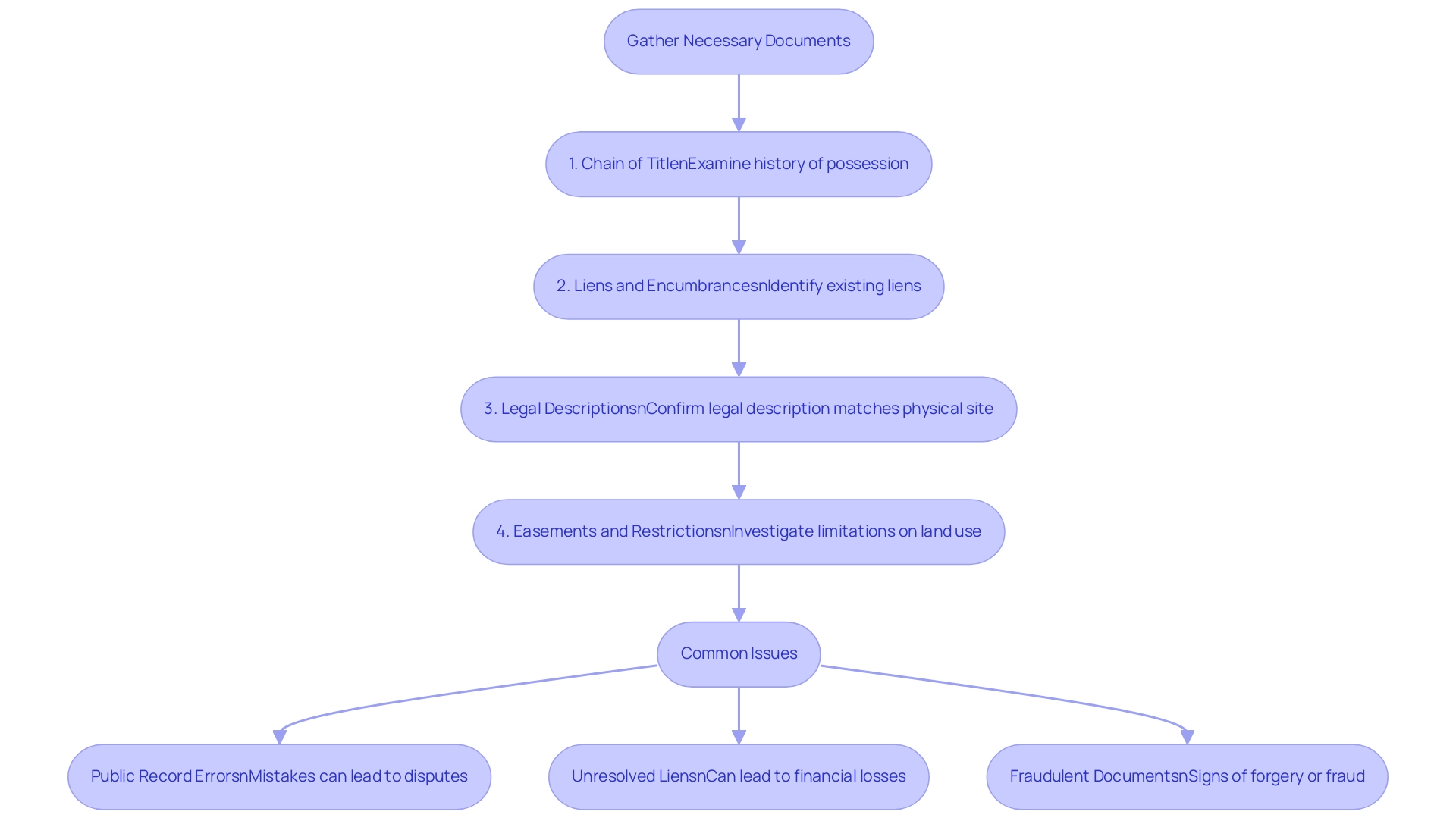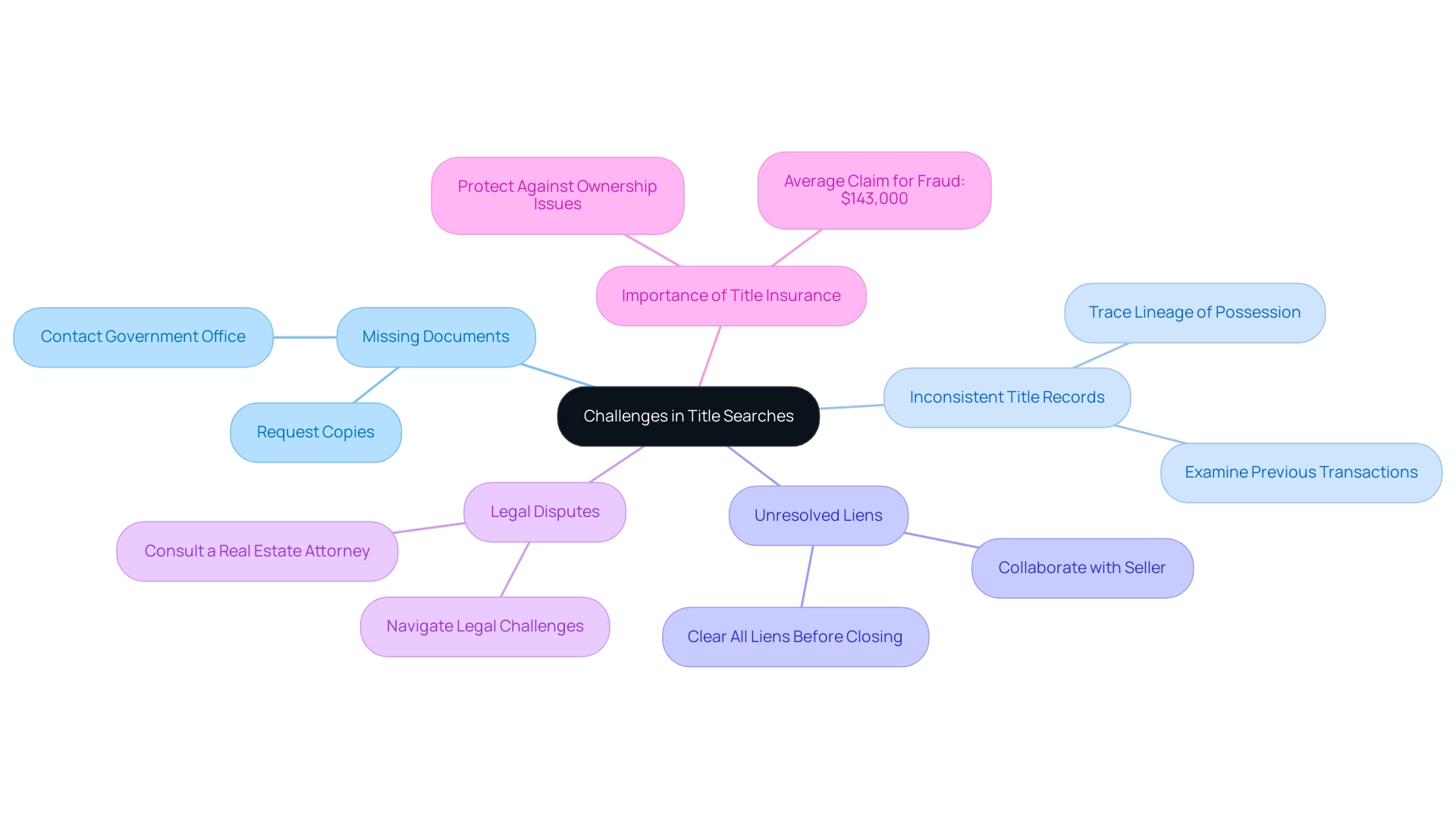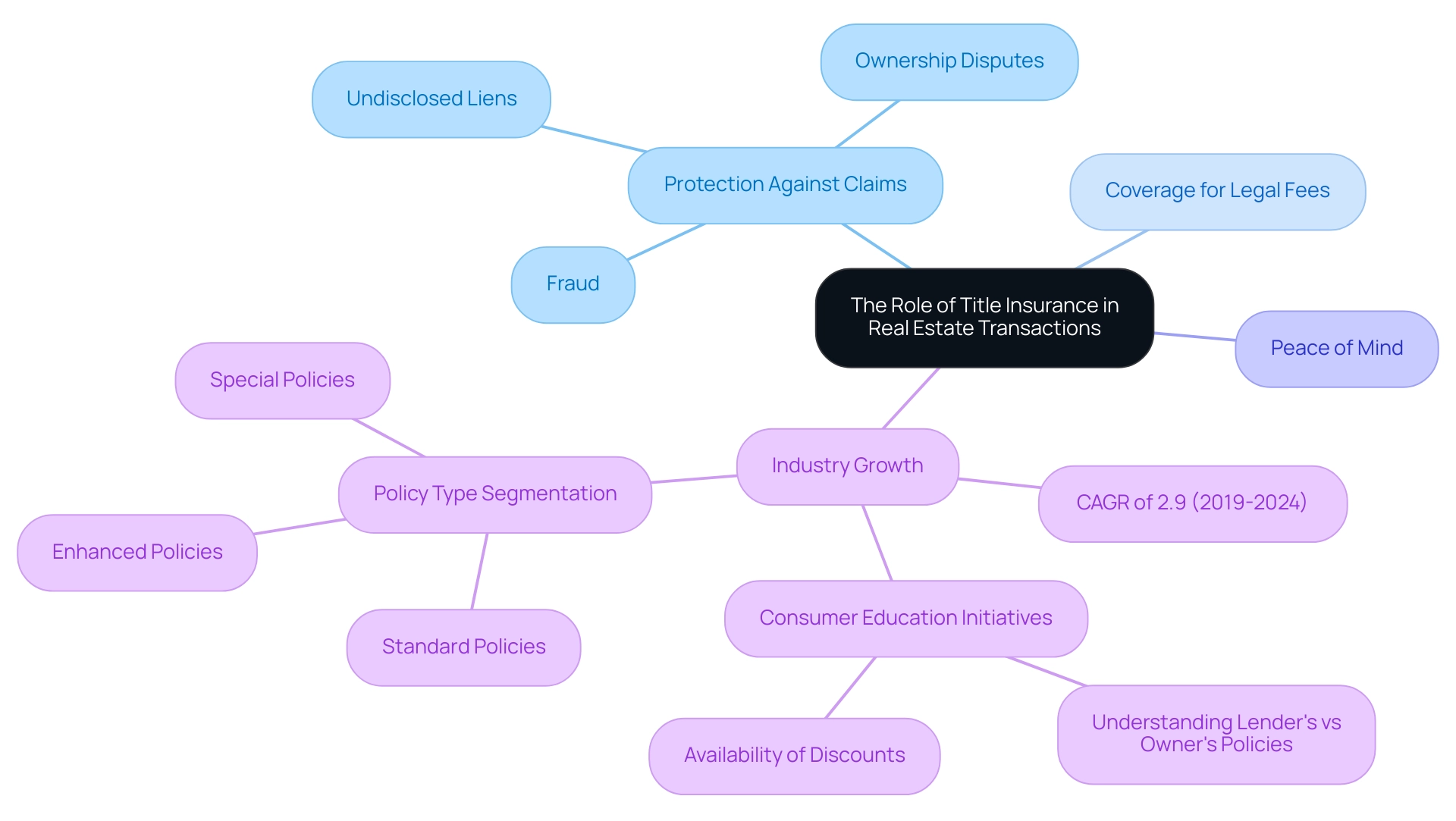Overview
Conducting a title search for a home necessitates a systematic approach that begins with:
- Gathering asset details
- Understanding local laws
- Utilizing appropriate resources
- Preparing financial information
This process is not merely a formality; it serves as a vital step to uncover any potential claims or liens. A thorough examination is essential for protecting buyers from future legal issues and ensuring a smoother transaction process. Therefore, investing time and effort into this research is imperative for a successful real estate experience.
Introduction
In the intricate world of real estate, the significance of a title search cannot be overstated. This meticulous process serves as the backbone of property transactions, ensuring that buyers secure clear ownership while safeguarding against hidden claims and liens.
- With approximately 80% of real estate deals relying on title companies, understanding the nuances of title searches is essential for anyone navigating the property market.
- Furthermore, the critical examination of public records and the innovative tools transforming the industry are fundamental aspects of this process.
- This article delves into the essential elements of title searches, the challenges faced, and the vital role of title insurance in protecting investments.
- As technology continues to reshape the landscape, the future of title searches promises to be more efficient and secure.
- Consequently, it is imperative for buyers and professionals alike to stay informed and proactive.
Understanding the Importance of a Title Search
A title search for home represents a meticulous examination of public records designed to confirm legal rights to real estate and uncover any existing claims or liens. This critical process, known as a title search for home, is indispensable in real estate transactions, ensuring that the seller possesses the legal authority to sell the asset and that the buyer secures clear title. Approximately 80% of real estate transactions involve firms specializing in property investigations, underscoring the significant reliance on thorough examinations.
The significance of a document review extends beyond mere confirmation; it is vital in revealing current claims that could potentially impact possession. For instance, in the case of Daniel Kenigsberg, a properly issued insurance policy shielded developers from ownership disputes, illustrating the protective nature of comprehensive property examinations. Conversely, the Connecticut fraud case highlights the critical role of both Lender and Owner's Insurance policies in mitigating risks associated with ambiguous ownership.
In this scenario, the lack of a thorough examination led to substantial financial losses for the parties involved, emphasizing the essential nature of this process.
Investing in a comprehensive title search for home transcends a mere procedural step; it constitutes a strategic measure to protect against future legal conflicts stemming from undisclosed liens or claims by former owners. As noted by the Real Estate Professionals Association, 'A comprehensive examination is a commitment to your property's clear legal status.' By acknowledging the importance of documentation examinations, purchasers can significantly reduce the likelihood of encountering legal issues that could jeopardize their investments, ensuring a smoother transaction process and peace of mind.
Moreover, the research profession is becoming increasingly relevant, as location quotients indicate a rising concentration of occupational employment in this field compared to the national average. Furthermore, companies and investors are turning to unconventional data sources for deeper insights, reflecting the evolving dynamics of property inquiries and the necessity for professionals to adapt to these trends.
Preparing for Your Title Search: Essential Preliminary Steps
Before initiating a title search for a home, it is essential to gather all pertinent information regarding the asset. The following preliminary steps will establish a robust foundation for a successful search:
- Collect Asset Details: Start by gathering crucial information about the asset, including its address, parcel number, and any historical records of possession. This understanding is vital for conducting a title search for a home and accurately tracing the ownership history.
- Understand Local Laws: Each state has distinct regulations governing land ownership and title examinations. Familiarizing yourself with these local laws is crucial, as they can significantly impact the title search for a home process and the validity of the findings.
- Identify the Right Resources: Determine which local government offices or online databases maintain the property records you need. Utilizing resources such as county clerk offices or specialized databases can streamline your title search for a home, ensuring access to comprehensive data. Furthermore, leveraging Parse Ai's advanced machine learning tools, including the example manager that facilitates rapid document annotation, can expedite document processing and enhance the precision of research automation, enabling quicker extraction of essential information from document records.
- Prepare Financial Information: If applicable, compile any financial documents related to the asset, such as mortgage statements, tax records, or liens. Understanding the Propensity to Default Intel Score, which ranges from 0 to 500, can provide insights into the likelihood of default within one year, underscoring the importance of financial implications in property ownership.
By diligently following these steps and utilizing Parse Ai's innovative solutions, you will be well-equipped to conduct a comprehensive examination, including a title search for a home, ultimately enhancing the precision and efficiency of your research process. Parse AI was founded by a team of energy, real estate, and technology experts with over 50 years of industry experience, utilizing their expertise to elevate the sector into the future.

Methods and Tools for Conducting a Title Search
Conducting a title search is a critical endeavor, employing several effective methods and tools that can streamline the process and enhance accuracy:
- Online Databases: Many counties provide online access to real estate records via their official websites, such as county assessor's offices or local land registries. These platforms often house comprehensive data, including ownership history and asset descriptions, making them invaluable resources for title researchers. As Kayla Johansen, a Digital Marketing Specialist, notes, 'Google commands an impressive 95% of the mobile engine market share globally,' underscoring the importance of utilizing online databases for real estate records.
- Local Government Offices: For a more thorough inquiry, visiting local courthouses or recorder's offices can yield detailed records. These offices maintain essential documents such as deeds, liens, and tax information, crucial for verifying property ownership and identifying any encumbrances.
- Title Search Software: The use of specialized software can significantly enhance the efficiency of the ownership search process. Tools like Parse AI harness machine learning and optical character recognition to swiftly extract pertinent data from extensive collections of document titles. This technology not only accelerates the research process but also improves accuracy, enabling researchers to finalize abstracts and reports with greater confidence. The rise of AI-driven query systems, as demonstrated in recent case studies, highlights the growing trend of incorporating advanced technology into document examinations, rendering tools like Parse AI increasingly vital.
- Professional Title Firms: If the document examination process appears daunting, engaging the assistance of a professional firm can provide reassurance. These companies possess the expertise and resources necessary to conduct comprehensive investigations, ensuring that all potential issues are identified and addressed.
By leveraging these techniques and resources, real estate experts can efficiently gather the essential data required for thorough examinations, ultimately leading to more informed choices and smoother transactions. Furthermore, usage statistics from online databases can guide collection management decisions and justify budget allocations, further reinforcing the effectiveness of these tools in the search process.
Analyzing Title Documents: Key Elements and Common Issues
Once you have gathered the necessary documents, the next critical step is to conduct a thorough analysis. Focus on the following key elements:
- Chain of Title: Examine the history of possession meticulously to ensure there are no gaps or discrepancies. A thoroughly recorded sequence of rights is crucial for establishing clear possession.
- Liens and Encumbrances: Identify any existing liens, such as mortgages or tax liens, that could impact ownership. Statistics indicate that roughly 20% of document inquiries uncover liens or encumbrances, underscoring the significance of this step. Encumbrances are legal constraints on real estate that can affect its value and usage, making a title search for home essential to identify them.
- Legal Descriptions: Confirm that the legal description of the asset corresponds with the physical site being acquired. Discrepancies here can lead to significant legal complications.
- Easements and Restrictions: Investigate any easements or restrictions that may limit the use of the land. Understanding these limitations is crucial for future land development or usage.
Common Issues to Watch For:
- Public Record Errors: Mistakes in public records can lead to ownership disputes, which can be costly and time-consuming to resolve.
- Unresolved Liens: Liens that remain unresolved can pose significant risks, potentially leading to financial losses. The average cost associated with resolving such claims can reach around $26,000, highlighting the importance of addressing these issues promptly.
- Fraudulent Documents: Remain vigilant for signs of forgery or fraudulent claims. A significant case involved criminals impersonating landowners to forge deeds, resulting in substantial financial losses for unsuspecting buyers. As Dax Junker, President of TC&E, stated, "While it should be clear that combating transfer fraud requires proactive measures, continuous vigilance, and robust collaboration, the rise in these scams also calls for a renewed commitment by the real estate industry to ensure a secure, healthy housing market." Title insurance serves as a protective measure against such fraud, safeguarding property owners from potential losses due to invalid transactions.
By carefully analyzing these elements during a title search for home, you can proactively identify potential issues before they escalate, ensuring a smoother transaction process and protecting your clients' interests.

Overcoming Challenges in Title Searches: Common Discrepancies and Solutions
Conducting an inquiry into ownership presents multiple obstacles that require careful navigation. Understanding these challenges is essential for a successful title search. Below are common discrepancies encountered during the process, accompanied by effective strategies for resolution:
- Missing Documents: The absence of documents necessitates reaching out to the appropriate government office to request copies or confirm their existence. Statistics indicate that missing documents are a prevalent issue in property inquiries, often leading to delays and potential mistakes. Common errors in document examination include undiscovered liens and inaccuracies in public records, further complicating the process.
- Inconsistent Title Records: Discrepancies in title records can hinder the title search for a home. To address this, it is vital to trace the lineage of possession by examining previous owners and their transactions. This thorough investigation clarifies property history and identifies potential issues, such as undisclosed owners or boundary disputes.
- Unresolved Liens: Encountering unresolved liens poses significant risks. It is crucial to collaborate with the seller to ensure that all liens are cleared prior to closing. This proactive approach is essential, as unresolved liens can lead to costly legal conflicts and jeopardize property rights.
- Legal Disputes: When legal disputes arise regarding ownership, consulting a real estate attorney is advisable. Their expertise provides valuable guidance and assists in navigating complex legal challenges.
Addressing these challenges directly simplifies the title search for a home and protects your real estate investment. The importance of ownership insurance cannot be overstated; it safeguards against various issues that may arise post-purchase. A study reveals that the average claim for fraud or forgery can reach $143,000, underscoring the necessity of securing an owner's policy and insurance.
Moreover, obtaining insurance for ownership is strongly recommended to protect against ownership-related issues. The case study 'Play It Safe' illustrates the potential legal disputes and financial setbacks that can occur without it. By remaining proactive and informed, you can mitigate risks and ensure a successful ownership search. Furthermore, utilizing Parse AI can lead to significant cost savings compared to traditional research methods, enhancing efficiency in your workflow.

The Role of Title Insurance in Real Estate Transactions
Title insurance plays a crucial role in real estate transactions, offering essential protection against various potential issues that may surface post-purchase. Here are the key reasons why title insurance is indispensable:
- Protection Against Claims: Title insurance protects purchasers from claims associated with the property that may emerge from previous possession. This includes undisclosed liens, ownership disputes, or even fraud. In 2020 alone, insurance firms disbursed around $312 million in claims, mainly due to fraud, forged signatures, and human errors. This statistic underscores the necessity of this coverage, highlighting the risks that buyers face without it.
- Coverage for Legal Fees: In the event of a claim against ownership rights, title insurance can cover the legal fees incurred while defending against such claims. This financial protection is vital, as legal disputes can be costly and time-consuming, potentially jeopardizing the buyer's investment.
- Peace of Mind: Having ownership insurance provides buyers with peace of mind, knowing they are protected against unforeseen ownership issues. This assurance facilitates a smoother transaction process and instills greater confidence in their investment decisions.
The importance of ownership insurance in the title search for home transactions cannot be overstated. The insurance sector has witnessed a consistent growth rate of 2.9% from 2019 to 2024, indicating the rising acknowledgment of its significance among purchasers. Furthermore, consumer education initiatives have highlighted the need for potential homebuyers to understand the differences between lender’s and owner’s policies, particularly in relation to the title search for home and the availability of discounts.
A recent roundtable discussion highlighted joint initiatives between agents and housing advocates to improve consumer awareness, ensuring that buyers are well-informed and can benefit from premium discounts.
In 2025, the landscape of insurance related to property continues to evolve, with a significant percentage of buyers choosing this coverage to safeguard their rights. This trend highlights the critical role insurance plays in securing real estate investments and mitigating risks associated with property ownership during a title search for home. Additionally, it is important to note that the insurance market is segmented, with Standard Policies dominating due to their essential coverage for ownership defects.
This relevance further underscores the necessity of understanding insurance details, especially given that many consumers rely on real estate agent recommendations due to limited education stemming from infrequent home purchases.

The Future of Title Searches: Innovations and Technological Advancements
The future of document examinations is being significantly shaped by technological progress that enhances both efficiency and precision. Key innovations to monitor include:
- Artificial Intelligence: The integration of AI into the document search process automates document analysis, significantly reducing the time needed to identify potential issues. Parse AI exemplifies this by utilizing machine learning and optical character recognition to extract essential information from document titles. This capability enables researchers to complete abstracts and reports more quickly and accurately. Consequently, this shift not only streamlines workflows but also enhances the accuracy of findings, allowing researchers to focus on more complex tasks. Predictive analytics powered by AI further enhances risk assessment accuracy for property firms, providing a quantitative backing to the claims about AI's impact on efficiency and accuracy.
- Blockchain Technology: By offering a secure and transparent approach for documenting real estate transactions, blockchain technology has the potential to reduce fraud and mistakes in ownership records. Its immutable nature ensures that once a transaction is recorded, it cannot be altered, thereby increasing trust in ownership documentation. Furthermore, the rise of online platforms for title searches enables faster access to real estate records, making the process more accessible for purchasers and real estate experts alike. These platforms often integrate advanced retrieval functionalities, enabling users to obtain information efficiently and effectively.
- Data Analytics: Advanced data analytics tools are becoming essential in identifying trends and patterns in property ownership. By leveraging these insights, real estate professionals can make more informed decisions, ultimately leading to better outcomes for their clients. As these technologies continue to evolve, they promise to revolutionize the title search process, making it faster, more accurate, and more reliable, thereby addressing the pressing challenges faced by researchers today. As Sandee Belcher from M&M Title Co. noted, technology plays a crucial role in preventing fraud, highlighting the importance of innovations in title research.
Conclusion
The importance of a title search in real estate transactions cannot be overstated. It serves as a vital process that ensures buyers acquire clear ownership of properties while protecting against hidden claims and liens. The reliance on title companies for approximately 80% of real estate transactions highlights the significance of understanding title searches for both buyers and real estate professionals. By thoroughly examining public records, utilizing innovative tools, and addressing potential challenges, individuals can safeguard their investments and facilitate smoother transactions.
Furthermore, as technology continues to advance, the future of title searches appears promising. Innovations such as artificial intelligence and blockchain are poised to enhance efficiency and security. These developments will not only streamline the research process but also mitigate risks associated with property ownership. The integration of these technologies is essential in adapting to the evolving landscape of real estate, ensuring that professionals remain proactive in their approach.
In conclusion, staying informed about the nuances of title searches and the role of title insurance is crucial for anyone navigating the property market. By prioritizing thorough title searches and leveraging technological advancements, buyers can protect their investments and enjoy peace of mind in their real estate endeavors. The proactive measures taken today will pave the way for a more secure and efficient property transaction process in the future.
Frequently Asked Questions
What is a title search for a home?
A title search for a home is a meticulous examination of public records designed to confirm legal rights to real estate and uncover any existing claims or liens.
Why is a title search important in real estate transactions?
A title search is crucial because it ensures that the seller has the legal authority to sell the property and that the buyer secures a clear title, preventing potential legal conflicts in the future.
What percentage of real estate transactions involve title search firms?
Approximately 80% of real estate transactions involve firms that specialize in property investigations.
What can a document review reveal during a title search?
A document review can reveal current claims that may impact possession of the property, such as ownership disputes or undisclosed liens.
Can you provide an example of the importance of a title search?
In the case of Daniel Kenigsberg, a properly issued insurance policy protected developers from ownership disputes, showcasing the protective nature of comprehensive property examinations.
What risks are associated with not conducting a thorough title search?
A lack of thorough examination can lead to substantial financial losses, as seen in a Connecticut fraud case where ambiguous ownership led to significant issues for the parties involved.
How does a comprehensive title search benefit property buyers?
It serves as a strategic measure to protect against future legal conflicts stemming from undisclosed liens or claims by former owners, ensuring a smoother transaction process and peace of mind.
What preliminary steps should be taken before initiating a title search?
Key steps include collecting asset details, understanding local laws, identifying the right resources, and preparing financial information related to the asset.
Why is it important to understand local laws during a title search?
Each state has distinct regulations governing land ownership and title examinations, which can significantly impact the title search process and the validity of findings.
What resources can assist in conducting a title search?
Local government offices, online databases, and specialized tools like Parse Ai's advanced machine learning can streamline the title search process and enhance data accuracy.




